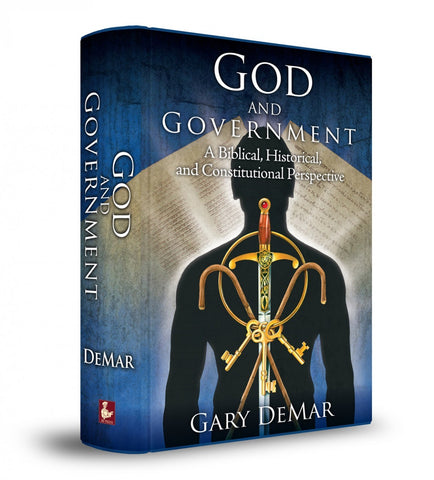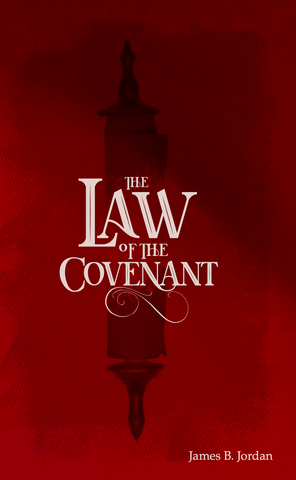Discussions about “dominion” have taken a wild turn. Dominion theology is equated with something called ‘Christian Nationalism.’ Here’s one example: “With a burgeoning interest in the idea of Christian Nationalism, the Christian Church in America has seen a renewed interest in modified versions of theonomy.” If “modified versions of theonomy” are operating, it might be best to get an accurate description and application of theonomy. One thing a well-informed theonomist will tell you is that politics is fourth behind self-, family, and church governments.

God and Government
With a fresh new look, more images, an extensive subject and scripture index, and an updated bibliography, God and Government is ready to prepare a whole new generation to take on the political and religious battles confronting Christians today. May it be used in a new awakening of Christians in America—not just to inform minds, but to stimulate action and secure a better tomorrow for our posterity.
Buy NowIn addition, R.J. Rushdoony called those promoting armed rebellion as “romantic revolutionaries” and James H. Billington described such dreamers as part of a “revolutionary faith” in his book Fire in the Minds of Men. You can read a synopsis of the book by David Chilton here.
Rushdoony aptly describes the religion of revolution:
We should not be surprised … that Marxists and other worshipers of chaos are committed to revolution even when the peaceful take-over of a country is possible. Revolution must be created by mass liquidations and the destruction of all established law and order, including economic order. The “economics" of socialism (and welfare states) do not make sense because they are not intended to make sense: they are a defiance of the universe of God in the name of chaos. They invoke chaos as the highway to the golden age.
If they fail, the guilt is not theirs. They blame the failure on residual areas and pockets of religion, law, and order, or property and national loyalty. Their solution therefore is to increase the chaos. Since their universe is a universe of chaos: their golden age can only come through planned chaos. Hence, they deny the validity of the biblical God; they cannot accept a world of moral and economic law. Their golden age requires the triumph of man over religion, over morality, and over economics. The liberation of man requires the systematic violation and destruction of every law sphere.[1]
D. James Kennedy, the late Senior Pastor of Coral Ridge Presbyterian Church, was a vocal advocate of what he and others have called the “cultural mandate.” He defined it this way:
As the vice-regents of God, we are to bring His truth and His will to bear on every sphere of our world and our society. We are to exercise godly dominion and influence over our neighborhoods, our schools, our government, our literature and arts, our sports arenas, our entertainment media, our news media, our scientific endeavors—in short, over every aspect and institution of human society.[2]
There is nothing unusual about advocating dominion based on Genesis 1:26-28. Even some dispensationalists support it (see Does the Church Win by Losing?). There are some Christians who argue that post-AD 70 that any form of dominion has been done away with. Christians should narrow their focus to the “spiritual dominion of Jesus Christ and the effect of His cross, risen life, and Parousia and His love working through us.” All forms of biblical dominion begin with regeneration that’s dependent on the cross and the risen Christ. But the Christian life doesn’t stop with the new birth, the milk stage. “But solid food is for the mature, who because of practice have their senses trained to discern good and evil” (Heb. 5:11-14). We’re back again to “by what standard?”
Second, contrary to Rob Bowman,[3] even non-Reconstructionists have seen a relationship between the “dominion mandate” of Genesis and the Great Commission of Matthew 28:18-20. Dr. Harold John Ockenga, in his Introduction to Carl F. H. Henry’s The Uneasy Conscience of Modern Fundamentalism, wrote the following (note the date) in 1947:
A Christian world- and life-view embracing world questions, societal needs, personal education ought to rise out of Matt. 28:18-21 as much as evangelism does. Culture depends on such a view, and Fundamentalism is prodigally dissipating the Christian culture accretion of centuries, a serious sin. A sorry answer lies in the abandonment of social fields to the secularist.[4]
It is interesting that Henry Morris, certainly not known as a dominionist, theonomist, or reconstructionist set forth a theology of dominion in his book The Biblical Basis for Modern Science. According to Morris, the “dominion mandate” (his usage) includes science, technology, the humanities, commerce, law, civil government, and education, in short, every facet of human culture. Morris notes:
[L]ong before [the Great Commission] another great commission was given to all men, whether saved or unsaved, merely by virtue of being men created by God in His image. It also had worldwide scope, and has never been rescinded. It had to do with implementing God’s purpose in His work of creation, just as Christ’s commission was for implementing His work of salvation and reconciliation.[5]
Morris says that the command to subdue the earth means “bringing all earth’s systems and processes into a state of optimum productivity and utility, offering the greatest glory to God and benefit to mankind.”[6] So then, there is nothing unusual about advocating dominion based on Genesis 1:26–28. Dominion is not all about politics. In fact, politics plays a small part in those who hold dominion theology.
The above sources immediately came to mind. With more research, I could find a lot more.[7] But, of course, these comments do not on their own refute Mr. Bowman’s assertion that there is no such mandate. Just because other theologians believe the Bible teaches a doctrine does not make it true. It’s a bit misleading, however, in leaving the impression that the dominion mandate is a manufactured doctrine of Reconstructionism.
Third, dominion is an “inescapable concept.” Dominion will be mandated, exercised, and applied. The question is: What standard will be used to “take dominion,” and “take” is the appropriate word to use when it comes to an organization like the World Economic Forum (WEF)? Rushdoony writes: “Dominion does not disappear when a man renounces it; it is simply transferred to another person, perhaps to his wife, children, employer, or the state. Where the individual surrenders his due dominion, where the family abdicates it, and the worker and employer reduce it, there another party, usually the state, concentrates dominion. Where organized society surrenders power, the mob gains it proportionate to the surrender.”[8]
Bowman asks whether Christians are “supposed to take dominion.” The fact that dominion is being taken is some evidence that dominion is an attribute of man who was created in God’s image. Since God is a dominion God, we should expect man, created in God’s image, to reflect an aspect of His dominion attribute. When Reconstructionists talk about “taking dominion,” they mean exercising dominion according to biblical norms rather than humanistic ones. Gary North makes this point:
What distinguishes biblical dominion religion from satanic power religion is ethics. Is the person who seeks power doing so primarily for the glory of God and for himself secondarily, and only to the extent that he is God’s lawful and covenantally faithful representative? If so, he will act in terms of God’s Bible-based ethical standards and in terms of a profession of faith in the God of the Bible. The church has recognized this two-fold requirement historically, and has established a dual requirement for membership: profession of faith and a godly life.
In contrast, power religion is a religion of autonomy. It affirms that “My power and the might of mine hand hath gotten me this wealth” (Deut. 8:17). It seeks power or wealth in order to make credible this very claim.
When a farmer buys land that has been depleted of its ability to produce good crops because of poor soil management and he then invests time, labor, expertise, and the necessary tried-and-true methods to bring the land back to life, he is taking dominion. He’s not forcing others to work the land or buy the fruit of his labor.

The Law of the Covenant
If we take a man-centered approach to these laws, we might say that the purpose of this legislation is only to ensure human prosperity. Such an approach to the law of God misses the most basic point. These laws show us God's own genuine personal care for His world, and as such these laws cannot be altered by human whim. To be sure, the Bible is man-oriented, and thus obedience to these laws will improve human life; but the laws are God's, and cannot be changed by man. Thus, as we examine the laws in Exodus 21-23, our first concern must be the glory of God, not whether these laws seem right to us sinful men. If we start with God, we will soon see how these laws also improve human life.
Buy NowBowman continues with another misconception:
[The claim of a dominion mandate] does not bear close scrutiny of the texts. In Genesis 1:28 God gives dominion over the animal kingdom to man.
God created the earth for His image-bearers to live and act on their special status. God gave us the world under His sovereignty. He didn’t create the Earth for the plants, minerals, and animals to dominate the world. There are two aspects of God’s command relating to dominion: subdue and fill the earth and rule over the animals. So then, all the earth’s potentialities are legitimate, even mandated, domains for our activity. This is why the “dominion mandate” is often described as the “cultural” or “creation mandate.” Culture is the object. This includes art, music, literature, technology, education, invention, and the sciences. The ethical application of the Bible is the standard for mining these potentialities. See Vishal Mangalwadi’s book The Book That Made Your World: How the Bible Created the Soul of Western Civilization.
[1] The Religion of Revolution (Victoria, TX: Trinity Episcopal Church, 1965), [3-4].
[2] D. James Kennedy, Led by the Carpenter: Finding God’s Purpose for Your Life (Nashville: Thomas Nelson Publishers, 1999), 7.
[3] Robert M. Bowman, “Are Christians Supposed to Take Dominion?,” Christian Research Journal (Fall 1988).
[4] Harold J. Ockenga, “Introduction,” in Carl F. H. Henry, The Uneasy Conscience of Modern Fundamentalism (Grand Rapids, MI: Eerdmans, 1947), 14.
[5] Henry M. Morris, The Biblical Basis for Modern Science (Grand Rapids, MI: Baker Book House, 1984), 41. “The responsibility of administering capital punishment is the greatest responsibility of human government. It implicitly entails the obligation also to control those human actions which, if unchecked, could easily (and often do) lead to murder (e.g., robbery, adultery, slander, greed). The dual role of government is that of both protection and punishment–protection of the lives, property, and freedoms of its citizens, and just retribution on those citizens who deprive other citizens of life, possessions, or liberty” (45-46).
[6] Morris, The Biblical Basis for Modern Science, 41.
[7] For example, J. Gresham Machen, “Christianity and Culture,” originally published in The Princeton Theological Review, Vol. IX, 1913 and Henry R. Van Til, The Calvinistic Concept of Culture (Grand Rapids, MI: Baker Book House, 1959). See my three chapters in Theonomy: An Informed Response that’s been republished by American Vision.
[8] Rousas J. Rushdoony, The Institutes of Biblical Law (Nutley, NJ: The Craig Press, 1973), 448.

